Charlène Favier discusses her debut feature film, Slalom, which depicts childhood sexual abuse in the world of high level sports, a world Favier knows from personal experience. Listen to our podcast on the film.
Watch the film Slalom in virtual cinemas here.
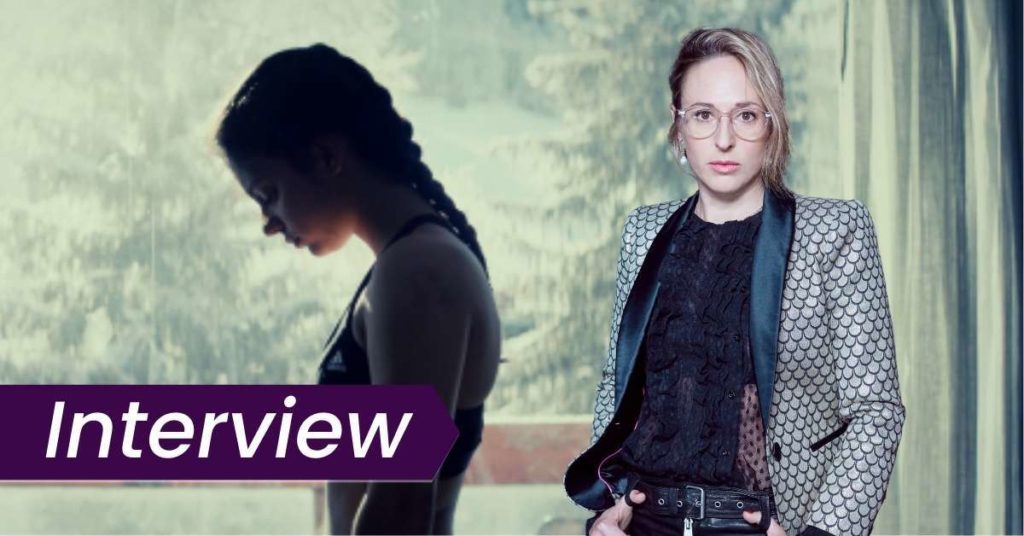
Discover one film you didn’t know you needed:
Not in the zeitgeist. Not pushed by streamers.
But still easy to find — and worth sitting with.
And a guide to help you do just that.
Charlène Favier’s first feature film, Slalom (which I reviewed last year), tackles childhood sexual assault with nuance and sensitivity, if also a few minor missteps. Slalom received the Cannes label last year, and it was released in virtual cinemas in Canada and the US last month. It’s an engaging, difficult film, but one that begs for in-depth discussion, both about abusive patriarchal forces and the film’s depiction of them. We went deep on the film in conversation with Benedict Andrews’s Una and Jennifer Fox’s The Tale on the Seventh Row podcast, and it was one of our most in-depth and fascinating discussions to date.
Slalom centres around Lyz (Noée Abita, one of our fifty screen stars of tomorrow), a fifteen-year-old who is starting to train in slalom skiing at a high level at a special school for athletes. Her mother has just gotten a job in another city, leaving Lyz to fend for herself in their own apartment, isolated both at home and at school where she’s a new student. Here, she is coached by Fred (Jérémie Renier), who eventually takes a liking to Lyz, supporting her as an athlete while also, increasingly, taking advantage of her sexually. He’s a confusing figure for Lyz because he plays hot and cold: kind one minute and cold the next, often due to his own self-loathing. She relies on his support to achieve her dream of being an Olympic skier, which means speaking out about the abuse she’s experiencing feels impossible.
Two of the film’s most challenging and contentious scenes are those that depict Fred sexually assaulting Lyz. The film is shot from Lyz’s perspective, but the assault scenes allow us to see Fred’s reactions, too, even if Abita’s traumatised performance is inevitably our focus. The first scene takes place at night, and Fred takes Lyz somewhere where she can drive a car for the first time in the snow, fast and furious. They’re celebrating her recent victory. And then suddenly, Fred kisses her, and puts her hand in his pants, forcing her to get him off. The second scene involves a penetrative rape. While training in the gym with Fred, Lyz sustains a leg injury. Under the guise of initially checking her leg and caring for her injury, he suddenly becomes sexually aggressive and has penetrative sex with her without a condom.
On the podcast, we discussed how these assault scenes focused too much on Fred’s perspective, and sometimes followed tropes of romantic sex scenes (like him sniffing her underwear with ecstasy upon removing it). To frame our discussion, we were referring to an interview Favier and Renier gave with Salon, one of the only interviews available with the filmmaker at the time. There, they suggested that Fred had never before and would never again abuse another athlete and that the abuse came when a part of his rational self turned off and he became purely animalistic. We were concerned about the phrasing there, which suggested that perhaps Favier didn’t see the events as abuse, which was confusing because the film is often so thoughtful and sensitive about abuse.
After talking to Favier in depth about the film, I suspect that something got lost in translation in that interview. Kino Lorber kindly provided Favier and me with a translator, which was helpful, but as a French speaker, I was able to catch bits and pieces of what Favier said that could be lost when trying to translate a full paragraph of ideas. This can become particularly problematic when discussing subject matter as sensitive as sexual assault. And since the translator hadn’t seen the film, sometimes terms like “viol”, were translated as “abuse” rather than “rape”.
When I talked with Favier, I was impressed with her ability to tell her own story about sexual abuse on film, and her awareness of the unique breeding ground for this abuse that athletics provides. In fact, her film is now being used in sports teams and clubs across France as a tool to discuss sexual abuse in sports. She also talked about how, in her experience, there was a whisper network about which coaches were abusive, implying that serial abuse was common. She also clarified that Lyz wasn’t actually in love with Fred so much as confused about what was happening to her. Was his behaviour toward her that of a lover? Why did she feel so conflicted? But of course, it took a mental toll on Lyz who starts behaving more erratically and performing poorly in school, slowly unravelling.
I hope this interview will help clear the record when it comes to what Favier had intended with her film Slalom and how she envisions this smart and nuanced film about a subject that we, as a culture, are still learning to discuss and confront. In addition to discussing the depiction of abuse in the film, Favier told me about how she approached filming the ski competitions in a creative way, how her training as a mime affects how she directs actors, and how she approached the film’s sound design.
The interview was conducted in both English and French. The French sections have been translated into English by me, with the help of the translator provided during the interview.
Seventh Row (7R): What was the genesis of your first feature film, Slalom? What made you want to tell this story?
Charlène Favier: I started to write the story in 2014 when I was in the script workshop at La Fémis, which is a cinema school in Paris. I didn’t have the exact idea of this film in my mind when I entered the workshop. But all of my short films were about a woman between fifteen and twenty years old, and they were each stories that came from a part of me. It’s always a story about resilience and the woman who needs to find her identity.
I had this really personal heroine in mind already. I started to write. I really wanted to do a film in my hometown, Val d’Isère, a ski resort town. When I was at La Fémis, I was thirty, and I was finally ready to tell the story of Lyz, which is the story of something that I experienced in my life. So it came out onto the computer. I was a bit afraid of what I was writing, actually. It was not really conscious. But it was a necessity to tell the story.
I started writing in 2014 and we shot the film in 2019. It took me three years to write. It was really hard to write because I wanted it to be very subtle. I wanted to include all the contradictions of the character. Also, I had to step back from my own story and decide what to put in the film and what to keep to myself.
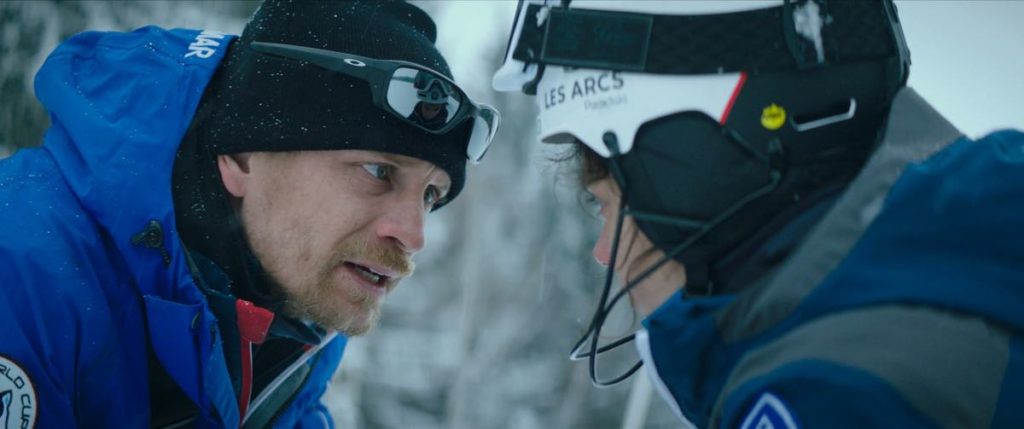
7R: I understand you were a downhill skier. What appealed to you about depicting slalom skiing on screen in your first feature film?
Charlène Favier: I like sports films, because having a protagonist have to deal with the sport gives a lot of tension to the film. I used to ski a lot, and I still do a lot of sports. It is really important in my life. My mom was really hard on me as a kid. She was a bit like Lyz’s mum in the film. She would tell me, “When you have a problem, don’t cry. You just go and run. You do sports, and that will be alright. No depression if you do sports.” I still do a lot of sports.
I really wanted to show the backstage of this world because I know it really well. I grew up in a very sporty family. My mom is a ski instructor, tennis instructor, and equestrian instructor. When I was a kid, it was like, “You have to do many things. You have to do sport. Go to the horse. Go to the sky. Go to the piano.” But I didn’t see my real life on screen.
We always depict the world of sports as something healthy because you train a lot. But I wanted to show what happens behind that, the ways in which it’s not healthy. There are a lot of excesses and a lack of boundaries. When you do sports at an intense level, we tend to forget what the basic rules are. It’s like it’s a world where everything is allowed. It’s as if it’s a world apart, where everything is excusable and possible.
7R: What were the challenges and opportunities of shooting the slalom skiing scenes in the film?
Charlène Favier: We didn’t have a lot of money to shoot this film. We didn’t have a lot of time. It was a five-week shoot with a budget of a little bit more than one million euros. I had to find a way that was cheap, quick, and that fit the mise en scene rules I created when I started to do the film. These rules were to do everything from Lyz’s point of view. In the end, I shot the ski scenes in the same way as the rest of the film or the sex scenes, for example: always from the point of view of Lyz, always in an organic way.
I found a really good skier who was also a really good cameraman. He’s holding the camera, skiing next to her, sometimes backwards. He’s following her like crazy. It was a bit magical. We were so afraid if he fell because the snow is really icy in a real competition; they put water on the snow all night to get it really hard. So it was an adventure, but he was really good. He understood what I wanted shot. He was always afraid. He was telling me it was probably not really stable. And I was like, “That’s what I want. I want something not stable. I want something with movement, with life in it. I don’t want something like [what] you see in competitions on TV. I want something much more organic.
What’s really important in those scenes is also the sound, because you are with Lyz’s breath. We did a lot of work in post-production to be in her breath, in her head. Sometimes, it’s the ski sounds, the scratch of the skis, the applause somewhere, and sometimes, it’s just her own breathing.
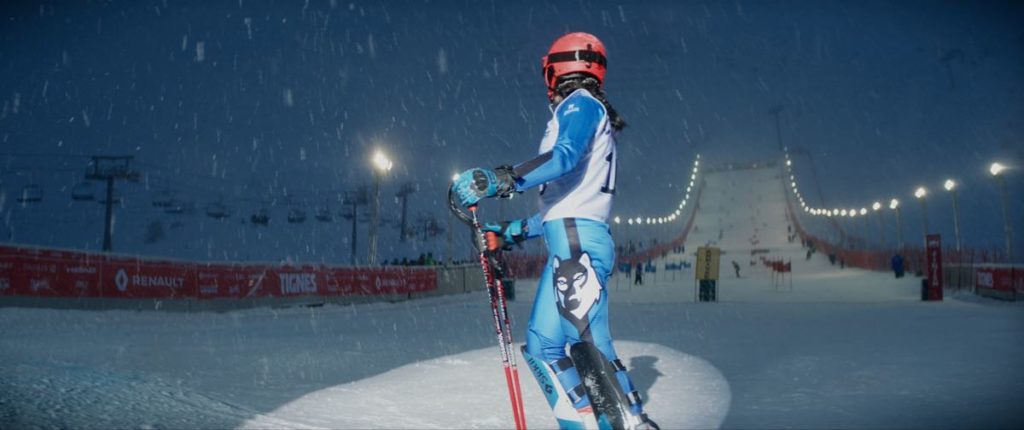
7R: Could you tell me a bit more about the sound design in the film Slalom?
Charlène Favier: All the competitions in the film were shot at real competitions. But sometimes, we had to shoot it after the show so nobody was there actually. We had to create everything in post-production. We didn’t have the money to pay all the extras to be there. We always had to find ideas to make the audience believe that we are in real ski competitions with people. Also, nobody goes to these competitions anyway. When you go to the World Cup, you think it’s going to be full of people, but there’s nobody there. Ski competitions are not an interest for French people.
It was really important for me to work on the sound of the snow. I was explaining to my sound editor that the sound of the snow is not always the same. Sometimes, it’s really, really crispy, and sometimes, it’s like cotton, and that’s another sound. It was important for me to play with those different sounds and how they relate to Lyz’s mood.
At the end, for the last look [that Lyz gives the camera], there’s breathing sounds when she says, “No.” I also put in the sounds of ravens, which you’d find in ski resorts in that area. They make these [high-pitched] sounds. Sometimes, you’re in a snow storm, but you hear these birds. So I put those birds there [in the scene at the end] just to make [it feel like] life [is] coming back.
7R: Can you tell me about how you thought about shooting the sex scenes?
Charlène Favier: The sex scenes were a real directorial challenge. It really helped that I made the short film Odol Gorri (2018) before. It allowed me to really test out how to shoot sex scenes. I was very afraid about the position of the camera because I needed to communicate that it was rape, but I wanted to show it was carried out with a certain sweetness to it. The brutality was in the impossibility for Lyz to say “no” because she doesn’t know what’s happening. So I really had to question how to film this scene. I didn’t want for the camera to be voyeuristic and showing the bodies. I wanted to stay on the pain in Lyz’s face and her emotions.
Sometimes, people ask me, “Have you been thinking about the female gaze?” I actually really was not thinking about that specifically. It’s not something I theorized. I don’t do that at the writing stage or in the filmmaking stage. I didn’t set out to make a movie about sexual abuse. I felt very strongly the need to bring this story to the screen. I really wanted to find a filmmaking approach that communicated how I had felt. It was really based on how I felt. I didn’t think about it as the female gaze. Now, people tell me, “Oh this is a clear case of the female gaze,” which is great, but if I’m honest, it’s not what I set out to do. What I wanted to do was talk about a personal story.
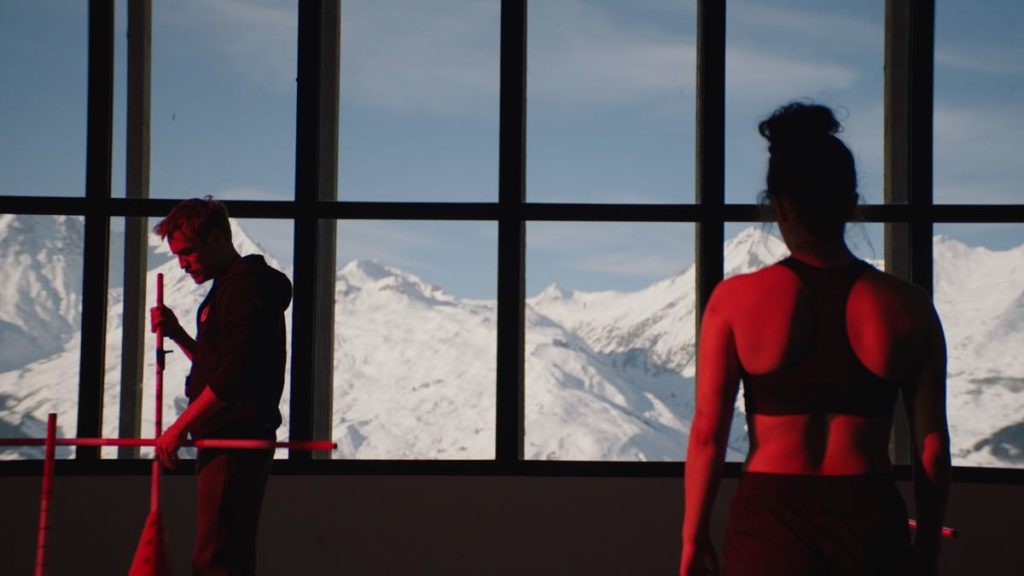
7R: How did you think about the differences between the sex scenes? There’s the one in the car, and also the one in the gym when she gets injured. How did you approach shooting each of them?
Charlène Favier: The two scenes are very different from each other. In the first scene, we start off in a moment of joy, pleasure, and discovery. She’s driving a car for the first time. She moves over to the driver’s seat. She was no longer just the passenger. She’s excited. All of a sudden, Fred kisses her. And her first reaction is, “Why not? Maybe this is what love is.” When he puts her hand in his pants, she doesn’t even realize what’s going on. It’s so hard for her to understand. So the scene goes from feeling like a fairytale to becoming a nightmare. Although it’s just a hand job, and there’s no penetration, it’s still a sexual assault. He still violates Lyz’s intimacy.
In the second scene, it starts off in the opposite way. She gets an injury while she’s training. She’s in pain and she’s suffering. And then he jumps on her for the second time. Here, he takes advantage of her in a moment of weakness. So here, she does realize that this is not right, not normal.
So the first time, we were in a moment of euphoria where she was in a very good mood and she felt maybe this is a little off or weird, but maybe this is normal for love. The second time, on the other hand, it starts from a moment of suffering, and she does realise that this is bad and not okay. She knows she was in pain, and so she realises this is not okay
7R: Can you tell me about the scene right after the rape where Lyz is in the bathroom by herself, and she is bleeding? It’s such a powerful and important moment.
Charlène Favier: That was something I tried in my short film Odol Gorri. It’s more or less exactly the same scene. It was really interesting for me to show how she’s going to make him believe that she’s alright. Even if she realized that something is wrong, she’s not able to tell him that something is wrong. She makes herself seem more okay than she is. That’s something that can be really misunderstood in the situation. Men can say, “Oh, she looks like she’s eighteen. She looks like she’s OK.” But actually, she’s a kid, and she’s pretending.
At this age, she wants to be an adult. She wants to be seen as someone important. Probably, he is the first one who looks at her. We can see that she’s a bit abandoned [by her mother]. So she’s saying to herself, “Okay. I’m suffering. This is not right. But what can I do? Do I lose everything? Or do I pretend that it’s good, and then at least I don’t lose him, and I don’t lose skiing.” She prefers to not lose him or skiing over telling the truth that she suffered.
Once the film came out in France, after screenings of the film, I spoke to a lot of really high level athletes. And I was contacted by the Ministry of Sports. This movie now is used as a tool in a lot of French sports clubs and in a lot of teams, and even by the League for Human Rights to be able to talk about abuse in the worlds of athletics, in the worlds of sport. Before, people were saying, “We don’t know how to talk about this. It’s too complicated.” Well, now they do know how it feels and they do have tools.
I had a chance to talk to an athlete who’s a woman who’s now the president of the French Skaters Association. She is older now, but she disclosed to me that she suffered herself when she was young. Her thought was, “I prefer to suffer in silence and not lose all those years of training and not lose my relationship with my coach. Is it more painful to lose something that you’ve devoted twelve years to, that your parents have invested all this time and energy into? I felt a little bit of pain in the shower, but he’s kind of good to me overall. He’s pretty nice. So what do I do at this point?” Most people, when faced with that question, do not speak, because the pain of losing it all is greater than the actual pain they are suffering in the moment.
The world of sports leads people to believe that the medals, the star status in the media, and the persona that one has become thanks to the sport are the most important things. And that’s why everybody shuts up. That’s why nobody speaks up. In most cases, when there’s a predator in that world, everybody knows about it, and everybody decides not to speak up. They decide that it’s not that bad, that what the sport gives us is a lot more important than what it has taken away from us. And then, it takes fifteen or twenty years for people to understand what had happened to them [if they were abused] and to heal. They don’t even realize what they’re going through [at the time that it is happening]. Once they do, the journey towards gaining their freedom again after this trauma is so hard.
7R: What was your process for working with Noée Abita to prepare her to make the film Slalom? I think she is so amazing in it.
Charlène Favier: We had worked together on my short film Odol Gorri. She had just been in one feature film before, which was in Cannes, called Ava (2017). That’s where I saw her for the first time. Straight away, I saw in her that she had the wild side that I wanted and also the fragile and really powerful side. She’s both. I’m a bit like that, too. I was looking for someone able to be really powerful with the eyes, with the body, and at the same time, really fragile like a kid. Noée is really like a kid, but at the same time, she can be a really powerful woman. That was really interesting as a personality to bring that to the character.
For Odol Gorri, we met a few days before the short. We talked a lot about ourselves, not really about the script because she understood straightaway what I was trying to tell. We were like sisters. We were like two animals who are looking at each other and smelling each other and telling each other, “Okay we understand everything. We don’t have to talk about that. We understand each other. Let’s just do it together.”
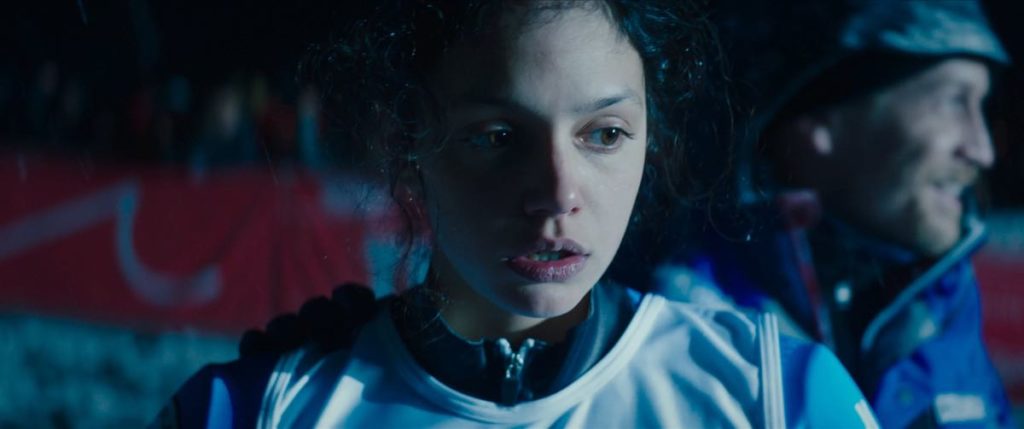
The relationship we built was really, really strong. After Odol Gorri, of course, I asked her to follow me for my feature film, Slalom. She lied to me because she told me that she had skied before, but that was not true. I learned the truth like two months before shooting the feature film. I was like, “Oh my god. How am I going to do this?” In the end, we used a body double.
But she had to enter into a skier body anyway because the body of a skier is really specific. It’s really specific to be a skier: the way you carry your skis, the way you look at the mountains, the way you walk with your ski boots. So she went to the mountains for two months with a ski coach who coached her as if she were a professional skier. She did swimming in the swimming pool, running in the forest at six o’clock in the morning, and waxing the skis.
She was watching skiing videos. She was doing a little skiing, and walking a lot with ski boots. She had a specific regime. She needs to be pushed, and when she’s pushed, she’s a really, really good actress. I had the relationship with her like a mother with her child. But at the same time, Noée is really mature and really sensitive. Sometimes, she would tell me, “This is wrong. I need to play it that way.” And she’s always right. She is really intuitive and instinctive. That’s how she acts, and that’s how I write and direct. That’s why we get along so well. It’s not intellectualized. It’s not conceptual. It really comes from your guts.
7R: What were some examples of when she said, “This is wrong. I have to do it this way,” on the film set of Slalom.
Charlène Favier: When she’s with her mother in the car, and her mother is telling her that she will not be here for Christmas, and she will have to [visit her] father. I told her that I think the character is crying there because it’s really hard for her to be abandoned again. And Noée told me, “No, she’s not crying. She will cry at the end [of the scene when she gets out of the car] only. I will do something, but she will not cry.” And she was right.
You can see the tears welling up in her eyes, but she doesn’t actually cry. The character, at this stage of the story, is still fighting for her dream to be a professional skier. And she’s thinking that Fred would save her anyway. So she said, “That hurts me, but I don’t give a shit because Fred is there. He is my new dad or my new man or my new whatever.” She doesn’t know what he is, but he’s there.
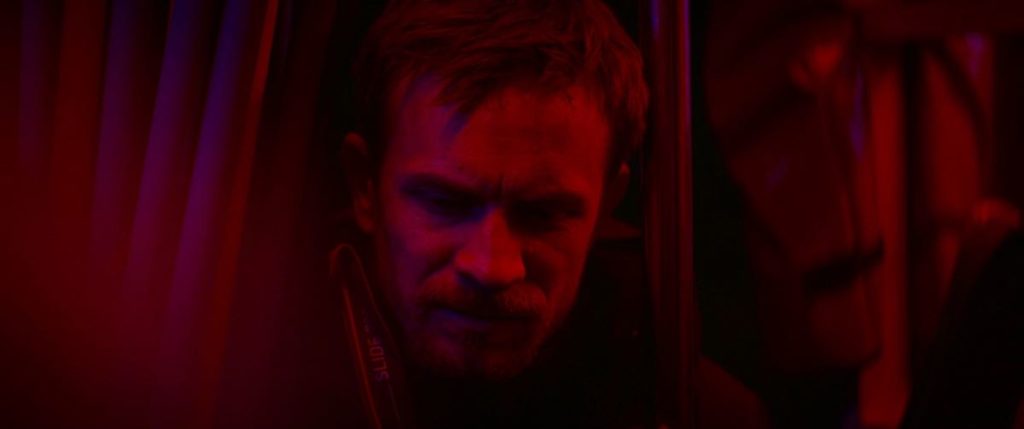
7R: How did you prepare with Jérémie Renier to film Slalom? I can see that being quite challenging for both of you, emotionally
Charlène Favier: I love Jérémie. We love each other so much. Noée, Jérémie, and me, we are inseparable for life. We are all really like brother and sister. We experienced a lot of similar stuff in our teenage years, so it was very easy and really fluid.
Early on, I sent the script to Jérémie, because I really wanted him to play the part in the film. He’s an actor I truly adore. And Jérémie works just like Noée and me; he’s very instinctual. He doesn’t intellectualise things. He has some very childish or childlike sides. He likes to crack jokes, and he likes to be a fool. At the same time, he can be very serious, very focused and laser sharp, and he feels things so deeply. He is very intense, very instinctual, and animal-like.
For him, it was really important to understand how a professional ski coach works with kids. Like Noée, he also worked with a ski coach, a different one, for maybe three weeks, following him in every lesson, every training [session], everywhere. And he was writing many, many notes in his little notebook about what the trainer was saying and doing, how he was talking. It’s a special vocabulary. Fred, in the script, doesn’t have a lot to say. There’s very little dialogue, but the words need to be [spoken] at the right time, the right place, the right terms. So he spent a lot of time learning that.
The character is really hard to play, and it’s really hard to understand this character. Sometimes, he’s really nice. Sometimes, you want to talk to him like a brother, and in the next scene, he’s awful, like a dictator, and he’s really violent. Sometimes, Jérémie was a bit lost. He was coming back to me and asking me, “How is Fred right now?” He was sometimes confused about his own morals. He always wanted to protect Fred, and sometimes, he didn’t want to be the abuser. But he knew that it’s a story about abuse. So we talked a lot about Fred’s moods.
He needed to be reassured and guided because Fred was like a labyrinth. He’s not a straight line character. He’s very complex and has lots of contradictions. There were times where Jérémie was really troubled and perturbed by certain scenes.
7R: He was troubled about how the character was behaving?
Charlène Favier: Yes, but it was more that he was impacted because it’s such a hard character to play. Often, in cinema, when you have a bad guy, it’s an obviously bad guy. And if you have a saviour, you know you’re playing a saviour. Whereas Fred was so many things at once. And that’s what I loved about this character. He’s not just a savior, but he’s also not just a wicked or violent guy. He goes between so many different ways of being. And Jérémie, who had almost become the character, felt lost at some points. I could feel it. Fred was so many things at different times: a brother, a father, and a lover.
During the shoot, Jérémie had his family there with him, his wife and kids, and he would tell me, “Look, when I go home to my family at night, I don’t feel well, and I don’t know what to tell them. I can’t even sleep.” He was so troubled emotionally because of the way the character was. He had sort of become the character, so it was not easy for him, emotionally.
7R: What was the process for working with Jérémie and Noée together once you got to set to film Slalom? What were the challenges?
Charlène Favier: In my short Odol Gorri, it was really hard. I like the main actor, Olivier Loustau, a lot, but it was much harder to work with him. We had battles and fights on the set. It was terrible for me and really hard for Noée. He was not like a brother. He was like a stranger afraid of playing this character and fighting with himself. He was like, “I’m not a bad guy and I have to play a bad guy, and I don’t know why I’m a bad guy. I want to be a good guy. Fuck you with your story of a woman abused!” It was really, really hard.
Jérémie was not like that. He understood exactly who the character was. He was really helping us to tell the story. We were telling the story together. We loved each other. It was really beautiful.
Jérémie and Noée are two actors who play a lot with their body. That helped a lot for the story because he’s a ski trainer and she’s a skier, so they had to be very aware of their bodies, because it’s a film with not a lot of dialogue.
We needed it to be like a cat and mouse. It’s a relationship, and there are different forces at play. It’s all conveyed through posture and through one’s gaze. I actually went to mime school, école Jacques Lecoq, which focuses on the body’s movement and how to communicate emotions without words. So I direct actors with very precise actions and body movements. You can have a posture where you approach somebody, and then the other person tends to pull back and their shoulders tighten. Through these physical relationships, you can tell so much about the characters.
7R: So would you give them directions of physical things to do? Or would you physically show them what you mean?
Charlène Favier: I don’t show them you have to do exactly the same stuff that I’m doing, but sometimes, I just put my body there, as well. We are all there, and we are going to fight to try to tell the emotion in the right way, even if it’s not comfortable. Because in life, it’s not comfortable. We are not all white or all black; we are full of shades and full of beauty.
With this method, you don’t have to talk so much. I was telling Noée and Jérémie before starting the shoot that, “We are going to perform. I want you to be the character.” Like in the US; I love in the US or in England, the way you work with actors, because they are completely engaged.
I remember in my mime school, in London, the professor was telling us, “You are leaving your home with the costume of the character, and you will stay there for one week, weekends included, in your character. You have to become your character. And if you think of what the character is doing, it is dead. It’s too late. You lose it. The audience will see the actor and not the character.”
We always work based on mutual respect, and we’re very watchful of each other. We create an intimate cocoon, where I’m there for all of them. I’ve been working with the same team, with the same crew, for ten years, and we’ve created a true family. We’re all there to watch each other’s back, and we’re all in the service of the movie.
The crew is very important in filmmaking because you’re not making this alone. There’s lots of people around. In my life, I always felt that I did not have a family around me. And through filmmaking, I recreated a new family, and we’re all there for the film.
You could be missing out on opportunities to watch great films like Slalom at virtual cinemas, VOD, and festivals.
Subscribe to the Seventh Row newsletter to stay in the know.
Subscribers to our newsletter get an email every Friday which details great new streaming options in Canada, the US, and the UK.
Click here to subscribe to the Seventh Row newsletter.
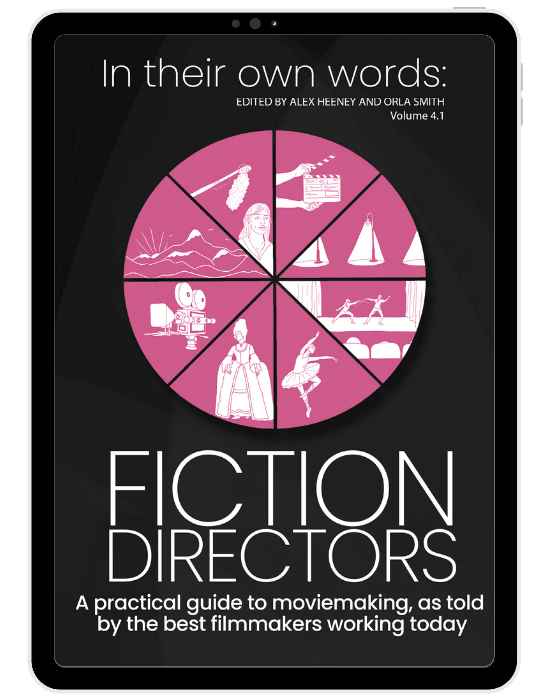
Discover how the best filmmakers working today approach filmmaking
A practical guide to moviemaking, as told by the best filmmakers working today.

